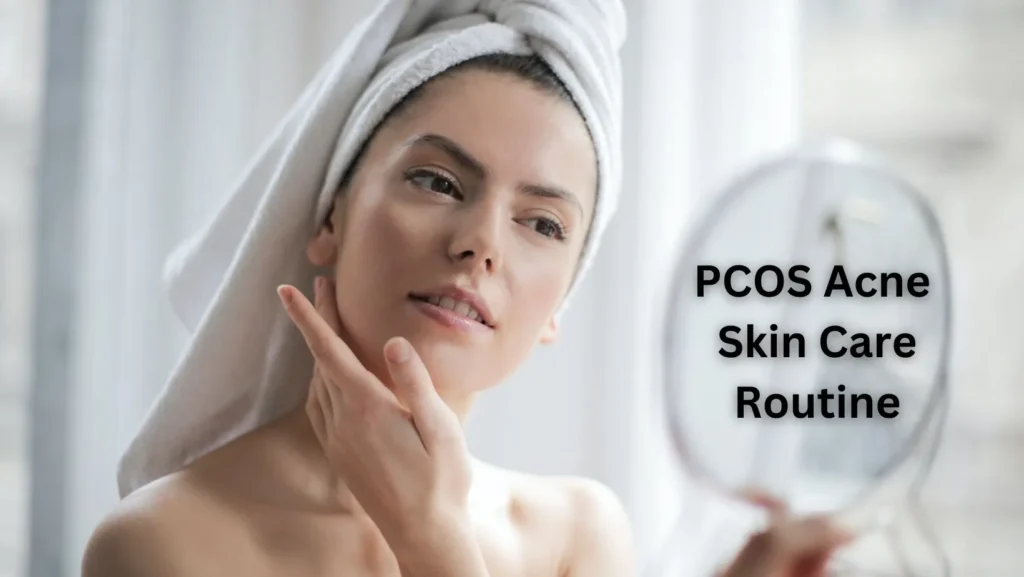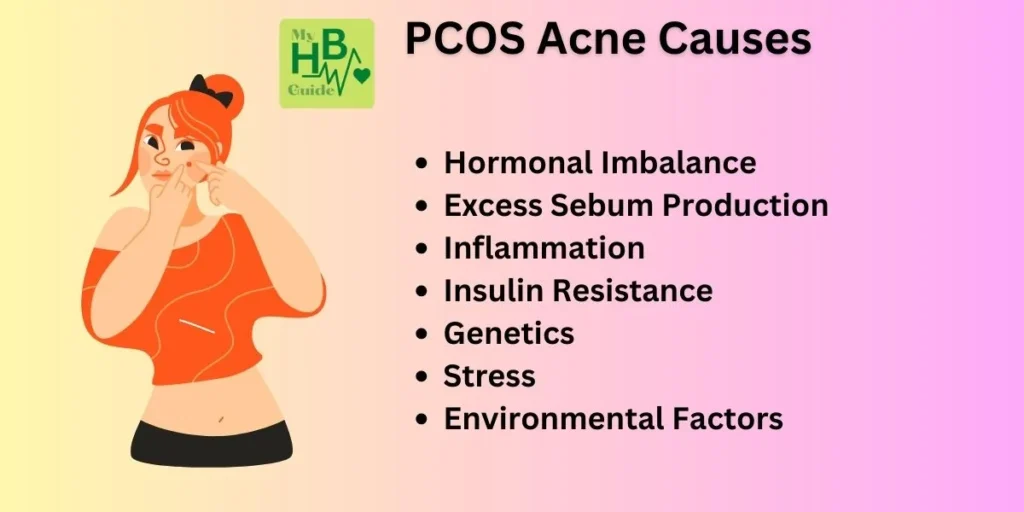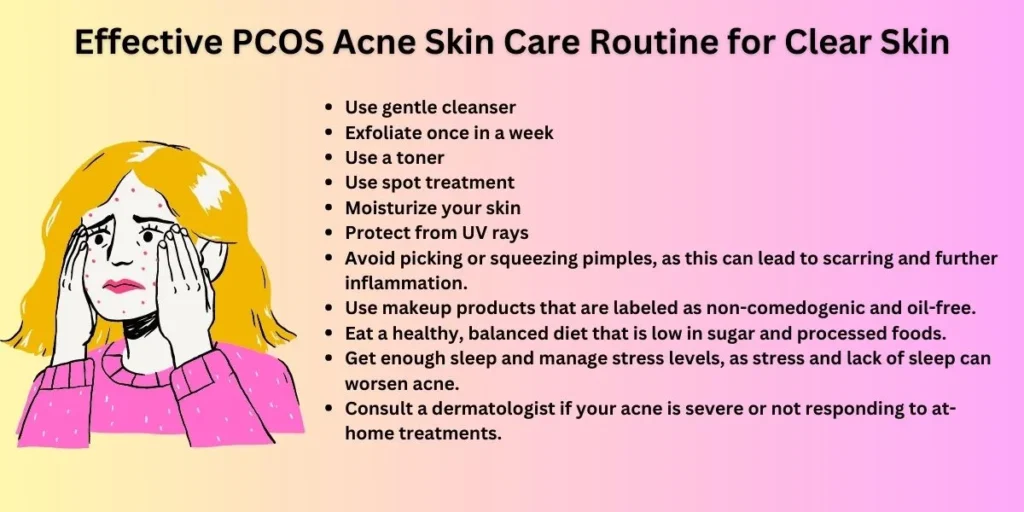Polycystic Ovary Syndrome (PCOS) affects millions of women worldwide, causing a range of symptoms, including acne. Acne is a common side effect of PCOS, which can affect a woman’s self-esteem and confidence. In this article, we will discuss a PCOS acne skin care routine that can help women with PCOS achieve clearer skin.
PCOS Acne Skin Care Routine: A Guide to Clearer Skin
- Wash your face twice every day with a soft and good cleanser.
- Exfoliate your face once or twice a week to remove dead skin cells.
- Moisturize your skin daily with a non-comedogenic light moisturizer.
- Use a targeted acne treatment for individual breakouts.
- Apply sunscreen on your skin with at least SPF 30 to protect against sunburn (hyperpigmentation).
- Discuss hormonal control management options with your healthcare provider.
- Maintain a light and healthy lifestyle with a balanced diet, exercise, and stress management.
- Avoid harsh, toxic chemicals and potential irritants in skincare products.
- Be patient and regular with your skincare routine.
- Consult with a good dermatologist if acne persists or worsens.
What is PCOS
PCOS Full Form Polycystic Ovary Syndrome. PCOS is a hormonal disorder that affects ladies of conceptive age which is also called reproductive age. It is characterized by a hormonal imbalance, such as increased levels of Androgens which is male hormones and insulin. This hormonal imbalance can lead to a numbers of symptoms, including acne. PCOS is a very common condition in women of childbearing age. In some cases, it can lead to serious health issues if not treated.

Symptoms of Pcos
- Irregular periods or no periods at all
- Excessive hair growth on the face, chest, stomach, or back (hirsutism)
- Acne or oily skin
- Weight gain or difficulty losing weight
- Thinning hair or hair loss from the head
- Darkening of the skin, especially around the neck, groin, or underarms
- Insulin resistance or high blood sugar levels
- Depression or anxiety
PCOS Acne Causes
The excess androgens in PCOS can stimulate the sebaceous glands in the skin to create more oil, prompting obstructed pores and acne. Moreover, the hormonal irregularity can lead to inflammation, which can worsen acne.

Polycystic ovary syndrome (PCOS) is a hormonal problem that affects women of reproductive age. It can cause a number of symptoms, including irregular periods, weight gain, and acne. In fact, acne is one of the most widely recognized side effects of PCOS, affecting up to 70% of women with the condition. There are many factors that contribute to the development of acne in PCOS.
Hormonal Imbalance
PCOS causes an imbalance in the levels of various hormones in the body, including androgens, insulin, and luteinizing hormone. High levels of androgens, which are male hormones, can caused sebum production and clogged pores, leading to acne. Insulin resistance, which is common in PCOS, can also contribute to hormonal imbalances and acne.
Excess Sebum Production
Women with PCOS are more likely to have oily skin due to excess sebum production. Androgens play an important role in sebum production, and when they are elevated in PCOS, the skin can become oily and prone to acne.
Inflammation
Inflammation is one of the another factor that can contribute to the development of acne in PCOS. High levels of insulin and cytokines, which are proteins that promote inflammation, are often seen in women with PCOS. This inflammation can lead to increased sebum production and clogged pores, leading to acne.
Insulin Resistance
As mentioned earlier, insulin resistance is a common feature of PCOS. Insulin resistance can lead to hormonal imbalances and inflammation, both of which can contribute to acne development.
Genetics
Genetics can also play important role in the development of acne in PCOS. Women with a family history of acne are more likely to develop the condition themselves.
Stress
Stress can exacerbate PCOS symptoms, including acne. Stress can cause hormonal imbalances and inflammation, both of which can contribute to acne development.
Environmental Factors
Environmental factors such as pollution, climate, and skincare products can also impact acne development in PCOS. Pollution and climate can cause oxidative stress, which can contribute to inflammation and acne development. Skincare products that are too harsh or comedogenic can also lead to acne.
Importance of a Skin Care Routine for PCOS Acne
A regular skin care routine is important for women with PCOS acne. It can help manage oil production, unclog pores, reduce inflammation, and improve the overall appearance of the skin.
PCOS Acne Skin Care Routine: Step-by-Step Guide

Cleansing
Proper cleansing is the foundation of any successful skin care routine. Start by washing your face twice a day with a gentle, pH-balanced cleanser that is free from harsh chemicals. Look for ingredients such as salicylic acid or benzoyl peroxide, known for their effectiveness in treating acne. Gently massage the cleanser onto your skin using circular motions, and rinse thoroughly with lukewarm water.
Exfoliation
Exfoliation helps remove dead skin cells, unclog pores, and promote cell turnover. However, it is essential to choose gentle exfoliants to avoid aggravating your skin. Opt for chemical exfoliants containing alpha-hydroxy acids (AHAs) or beta-hydroxy acids (BHAs) like glycolic acid or salicylic acid. Use an exfoliant once or twice a week, following the instructions on the product packaging.
Toning
Toning is a crucial step in rebalancing the skin’s pH levels and removing any residual impurities. Choose an alcohol-free toner with soothing and hydrating ingredients like witch hazel or rose water. Apply the toner to a cotton pad and gently swipe it across your face, focusing on acne-prone areas.
Treatment
When it comes to PCOS acne, targeted treatments can make a significant difference. Look for topical treatments containing ingredients like benzoyl peroxide, retinoids, or tea tree oil, known for their anti-inflammatory and antibacterial properties. Apply the treatment directly to active breakouts or as directed by your dermatologist.
Moisturization
Hydrating your skin is crucial, even if you have acne-prone skin. Choose a lightweight, oil-free moisturizer that won’t clog your pores. Look for ingredients like hyaluronic acid or ceramides that help maintain the skin’s moisture barrier. Apply the moisturizer in upward, circular motions until fully absorbed.
Sun Protection
Protecting your skin from harmful UV rays is essential to prevent acne scarring and hyperpigmentation. Use a broad-spectrum sunscreen with an SPF of 30 or higher. Apply it generously to your face and exposed skin areas every morning, even on cloudy days. Reapply every two hours if you are outdoors for an extended period.
Lifestyle Considerations
In addition to a dedicated skin care routine, certain lifestyle changes can significantly improve the condition of your skin:
Healthy Diet
Maintaining a well-balanced diet can positively impact your skin’s health. Incorporate foods rich in antioxidants, such as fruits, vegetables, and whole grains. Avoid highly processed foods, sugary snacks, and foods high in saturated fats. These dietary adjustments can help regulate hormone levels and reduce inflammation.
Regular Exercise
Engaging in regular physical activity not only benefits your overall health but also promotes healthy skin. Exercise helps improve blood circulation, which nourishes your skin cells and aids in the removal of toxins. Remember to shower and cleanse your face after a workout to prevent sweat from clogging your pores.
Stress Management
Chronic stress can worsen acne symptoms. Find healthy ways to manage stress, such as practicing yoga, meditation, deep breathing exercises, or engaging in hobbies that help you relax. Adequate sleep is also crucial for maintaining hormonal balance and allowing your skin to repair and rejuvenate.
Additional Tips for PCOS Acne Skin Care
- Avoid picking or squeezing pimples, as this can lead to scarring and further inflammation.
- Use makeup products that are labeled as non-comedogenic and oil-free.
- Eat a healthy, balanced diet that is low in sugar and processed foods.
- Get enough sleep and manage stress levels, as stress and lack of sleep can worsen acne.
- Consult a dermatologist if your acne is severe or not responding to at-home treatments.
PCOS Acne Skin Care Routine Precautions
If you have polycystic ovary syndrome (PCOS), you may be familiar with the frustrating and persistent acne that often accompanies this hormonal condition. While there is no cure for PCOS acne, a consistent skin care routine can help manage symptoms and prevent new breakouts. Here are some precautions to keep in mind when creating a PCOS acne skin care routine:
Know Your Skin Type
Before you begin any new skin care routine, it’s important to understand your skin type. PCOS acne can occur in people with oily or combination skin, so it’s important to choose products that are specifically designed for these skin types. Look for products that are labeled as “non-comedogenic” or “oil-free” to avoid clogging pores.
Avoid Harsh Ingredients
Many acne products contain harsh ingredients like benzoyl peroxide or salicylic acid, which can dry out the skin and cause irritation. For people with PCOS, whose skin may already be more sensitive due to hormonal imbalances, it’s important to choose gentle products that won’t exacerbate the problem. Look for products with natural ingredients like tea tree oil or aloe vera, which can help soothe and calm the skin.
Moisturize Regularly
Contrary to popular belief, people with oily or acne-prone skin still need to moisturize regularly to maintain healthy skin. Look for lightweight, oil-free moisturizers that won’t clog pores. Moisturizing regularly can help balance oil production and prevent dryness and irritation.
Don’t Overdo It
While it can be tempting to try every new acne-fighting product on the market, overdoing it can actually make acne worse. Stick to a consistent skin care routine with a few key products, and don’t introduce new products too quickly. This can help avoid overwhelming the skin and causing irritation or breakouts.
Protect Your Skin
Sun exposure can exacerbate acne and cause dark spots or hyperpigmentation. Always wear sunscreen with at least SPF 30, and consider wearing a hat or staying in the shade when possible to protect your skin from harmful UV rays.
Consider Professional Treatment
If your PCOS acne is particularly persistent or severe, consider seeking professional treatment from a dermatologist. They can help prescribe medication or recommend treatments like chemical peels or laser therapy to help manage symptoms.
By following these precautions and sticking to a consistent skin care routine, you can help manage PCOS acne and prevent new breakouts from occurring.
Conclusion
In conclusion, PCOS acne is caused by a combination of hormonal imbalances, excess sebum production, inflammation, insulin resistance, genetics, stress, and environmental factors. Understanding these causes is important for effective treatment of acne in women with PCOS.
PCOS acne can be frustrating and challenging to manage, but with a regular PCOS Acne Skin Care Routine and a few lifestyle changes, it is possible to achieve clearer skin. Following the steps outlined in this article, women with PCOS can take control of their acne and boost their confidence and self-esteem.
The diagram above illustrates the step-by-step PCOS acne skin care routine discussed in this article, serving as a visual guide to help you implement and follow the recommended steps effectively.
Note
The information provided in this article is for educational purposes only and should not replace professional medical advice. Always consult with a healthcare professional or dermatologist for personalized guidance regarding your skin care needs and concerns.
Read More about Acne
FAQ’s
What is the best treatment for acne in PCOS?
What is the best treatment for acne in PCOS?
The best treatment for acne in PCOS depends on the severity of the acne and the individual’s specific symptoms. Treatment options may include prescription medications such as birth control pills, spironolactone, or topical retinoids. Lifestyle changes such as maintaining a healthy diet and exercise regimen, stress management, and proper skincare can also help manage PCOS acne. It’s important to consult with a healthcare professional to determine the best treatment plan.
What skin care is good for PCOS?
When it comes to skincare for PCOS, it’s important to use gentle, non-comedogenic products that won’t clog pores or irritate the skin. Look for products that contain acne-fighting ingredients such as salicylic acid or benzoyl peroxide. It’s also recommended to use a gentle cleanser, moisturizer, and sunscreen daily, and to exfoliate the skin regularly to remove dead skin cells and prevent clogged pores.
What skincare products to avoid with PCOS?
When dealing with PCOS acne, it’s important to avoid skincare products that contain harsh chemicals, fragrances, and alcohol. These ingredients can irritate the skin and worsen acne breakouts. It’s also recommended to avoid heavy, oil-based moisturizers and opt for non-comedogenic products that won’t clog pores.
How I cured my PCOS acne naturally?
There is no known cure for PCOS acne, but it can be managed and improved through natural remedies such as maintaining a healthy diet, regular exercise, stress management, proper skincare, and herbal supplements. It’s important to consult with a healthcare professional before starting any new treatment or supplement regimen.
Does PCOS acne ever go away?
PCOS acne may improve with proper treatment and lifestyle changes, but it may not completely go away. Managing PCOS and its associated symptoms, including acne, is a lifelong process that requires ongoing effort and care.
What should I avoid with PCOS acne?
To manage PCOS acne, it’s important to avoid dairy products, sugar and carbs, certain medications, stress, over-washing your face, harsh exfoliants, picking and squeezing, heavy moisturizers, tight clothing, sun exposure, and smoking. Additionally, it’s recommended to watch your makeup products and clean your phone screen regularly. Seeking professional help is also a good idea.
Is PCOS acne curable?
There is no cure for PCOS acne, but it can be managed with a regular skin care routine and lifestyle changes.
Is PCOS acne just like regular acne?
No, PCOS acne is caused by hormonal imbalances and tends to be more persistent and difficult to treat than regular acne.
Can PCOS acne be prevented?
While PCOS acne cannot be prevented entirely, maintaining a regular skin care routine, eating a healthy diet, getting enough sleep, and managing stress levels can help reduce the frequency and severity of acne breakouts.
How long does it take to see results from a PCOS acne skin care routine?
It can take several weeks or even months to see results from a PCOS acne skin care routine. Consistency and patience are key.
Can PCOS acne be treated with medication?
Yes, some medications can help manage PCOS acne, such as birth control pills, spironolactone, and isotretinoin.
Does PCOS acne ever go away?
PCOS acne can go away with appropriate treatment. Proper medication and lifestyle changes, such as a healthy diet and regular exercise, can help to manage hormonal imbalances that cause PCOS-related acne. However, it’s important to consult with a healthcare professional for an accurate diagnosis and personalized treatment plan.
What is the best treatment for PCOS acne?
The best treatment for PCOS acne may vary depending on the individual and the severity of their acne. Hormonal therapies, such as birth control pills or spironolactone, are commonly prescribed to help regulate hormonal imbalances that can cause acne. Topical medications, such as retinoids and benzoyl peroxide, can also be effective in treating acne. In addition, lifestyle changes such as a healthy diet, regular exercise, and stress management techniques can also help improve skin health. It’s important to consult with a dermatologist or healthcare professional for personalized treatment recommendations.
How do you treat PCOS acne naturally?
There are several natural ways to manage PCOS acne, such as maintaining a healthy diet, exercising regularly, reducing stress levels, and using gentle skincare products. Some natural remedies, like tea tree oil and green tea, may also be helpful in reducing inflammation and improving skin health. However, it’s important to consult with a healthcare professional before trying any new treatments or remedies.
What skin care is good for PCOS?
Gentle skincare products that are non-comedogenic and free of harsh chemicals can be beneficial for PCOS skin. Look for products that contain ingredients like salicylic acid, benzoyl peroxide, or retinoids to help manage acne. It’s also important to avoid using heavy makeup or skincare products that may clog pores and worsen acne. Regularly cleansing and moisturizing the skin can help maintain its health and reduce breakouts. Consult with a dermatologist for personalized skincare recommendations.
What should I avoid with PCOS acne?
Avoid using heavy makeup or skincare products that may clog pores and worsen acne. Additionally, avoid consuming processed and high-glycemic index foods, as they can increase insulin levels and worsen hormonal imbalances that lead to PCOS-related acne. Dairy and foods high in saturated and trans fats should also be limited, as they can contribute to inflammation in the body.
What skincare products to avoid with PCOS?
Avoid skincare products that contain harsh chemicals, fragrances, or are comedogenic, meaning they can clog pores and worsen acne. Avoid using heavy makeup or skincare products that contain ingredients like alcohol, sulfates, or mineral oil. Opt for gentle, non-comedogenic skincare products that contain ingredients like salicylic acid or benzoyl peroxide to help manage PCOS-related acne.
